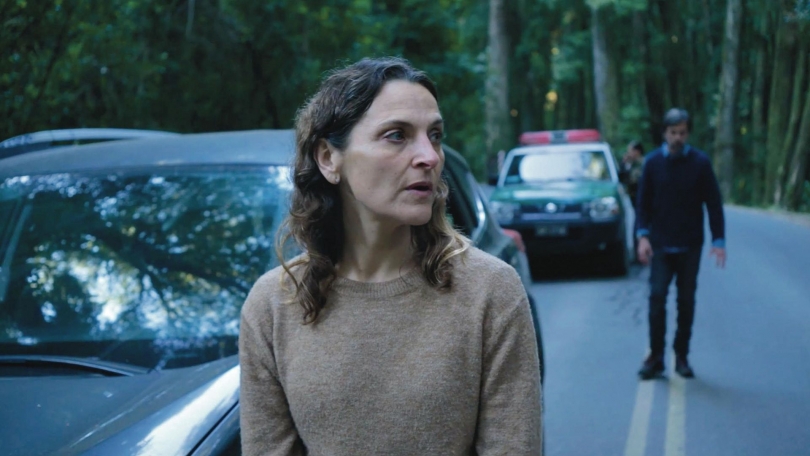The Punishment by Matías Bize Chile, Argentina, 2022 80 minutes
THE FILM RECEIVED THE BEST ACTRESS AWARD IN TALLINN
Reviewed by Lopa Kaul:
With a Masters in Literature, she has been writing and watching films since an early age and attending film festivals. Now she dabbles in music journalism while dreaming about writing her novel.
International premiere at Tallinn Black Nights Film Festival, official competition Chile, a deep dark forest, riddled with pumas and terrifying confessions, The Punishment is a touching film about the reality of parenthood and why mothers always get the short end of the stick. A strong contender at the Tallinn Black Nights Film Festival, the film begins with Lucas, a 7-year-old boy missing in a forest and his parents searching for him. From the get go, it is established that it is not a simple case of a missing child and the subsequent hunt but that there is an underlying and sinister truth that neither parent wants to face. We get Mateo, a distressed father who wears his heart on his sleeve and is giving his all in his search for his child. And then we have Ana, the one who catches everyone’s eye from the first minute as she is the stern mother who thinks Lucas is playing games with them and will turn up any moment.
To do justice to the film and its intricate weaving of each segment, beware of some minor spoilers. It is clear from the start that Ana thinks Lucas is hiding to punish his parents for punishing him. But we are not told as to what it is that he did or what the punishment was till we are absolutely invested and have no interest in walking out of the theatre. Matias Bize, the director does an impeccable job of getting the audience so immersed in the film yet keeping them at bay that while we can feel the emotions of the parents, we are still not privy to their secrets which later break through in the most heartbreaking of a climax. It is when we are finally told as to what the little child’s punishment was, we don’t even realise it as it is so expertly woven in the dialogues that there is a delay in reaction to the jaw-dropping moment that we have been waiting for from the beginning.
With just two major characters, Antonia Zegers’ Ana and Nestor Cantillana’s Mateo are the stars of the film as even one flaw in their synergy would have led to a disastrous result as one cannot forget to constantly commend Bize for taking on such a risky project. Mateo starts off as a good husband, good father, searching hard for his son, honest and everything good. Right when one is about to get irritated with his nice-guy act, he shows his true colors, a grey character just like his wife. He blames her, doesn’t understand her, doesn’t understand his child’s needs. We see a role reversal as he goes from an emotional breakdown to taking the upper hand when he succeeds in getting Ana to be distraught just like him. Ana on the other hand, starts off as a bad and strict mother who is more worried about what other people might say about them losing Lucas. She uses tough love but we see her slowly losing her composure. She doesn’t speak much, but her eyes give away her feelings, her voice changes from annoyance to desperation as she keeps calling out for Lucas. Her revelations in the climax shows her as a flawed person, yet someone women can relate to as she calls out the hypocrisy as more often than not women have to choose between their child and career while men don’t have to worry about that dichotomy.
With a handheld camera constantly following the characters searching for Lucas, in this one-take film we see their inner turmoil, their frustrations and feelings that bubble up during the hunt. Just as the audience is about to get bored with the constant calling out for Lucas, The Punishment reels us in, gets the viewers curious with tidbits of information, shocking revelations that has us asking for more. With the possibility of a repetitive and simple script, The Punishment’s screenwriter, Coral Cruz and director take us through a masterclass in how to weave a story with the simplest of plots. How did Lucas go missing? What was the punishment?
What did he do to get such a punishment? Is he actually missing or did the parents do something to him? Does Lucas hate his mother? Does Ana not want to find him? The film constantly has the viewers asking questions and quickly resolving them only to follow it up with a barrage of more, reminding viewers of the way Shehrezad kept her murderous husband at bay with her storytelling in Arabian Nights.
Devoid of music, The Punishment uses sounds of nature, echoes of the parents’ shouting, adds seriousness to the already worrying situation, that there is something more than what meets the eye, more than what the parents are not voicing out loud. An apt title, The Punishment delves into the world of parenting and how punishing a child with ADHD leads to the parents being punished as they forget to consider the consequences of their punishment. It is not the punishment of the child or the hunt that is important, it is the aftermath that leads to unravelling of the characters.
Thanks to Bijaya Jena
